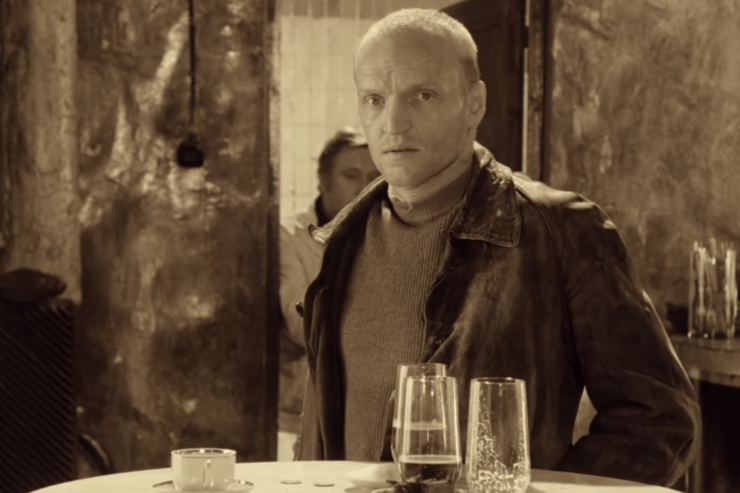In William Saroyan’s The Human Comedy, there’s a passage where the Eastern European immigrant owner of a grocery store is hectored by his young son for a variety of treats. The kid asks for an apple, an orange, a banana, a candy bar—quite a bounty considering this is taking place in the thick of WWII. Then, finding them all wanting, the child abandons the goodies, half-eaten. Exasperated by his son’s capriciousness—and the kid’s assumption of a random customer’s demand for not-in-stock, raisin-filled cookies (W.C. Fields, had he been more yiddishe, could’ve inserted this whole bit into It’s a Gift)—the grocer breaks down, begging the child to find satisfaction in the good things life has given him. Saroyan leaves ambiguous whether the entreaties have any effect on the child, and we can only hope that the desperate customer—on a mission for his own, sick kid—eventually finds another resource for those hallowed raisin cookies.
We’re all looking for the secret key to happiness, the one, true thing that will end our wanting. I suspect that few of us know exactly what that one thing would be—we have inklings, vague notions, but no clear vision. Part of that may be self-preservation—if we ever attained that goal, what need would there be to carry on? Part of it might be pure common sense, an understanding that the One True Thing doesn’t really exist, that it’s best that the goal be kept ill-defined and ever out-of-reach, so we have a reason to get out of bed every day.
In Andrei Tarkovsky’s Stalker (1979), the titular, nameless “Stalker” (Aleksandr Kaydanovskiy) is contracted by a similarly nameless professor (Nikolay Grinko) and a writer (Anatoliy Solonitsyn) to lead them into the Zone, a forbidden region where a vaguely defined phenomenon—possibly a meteor strike or, as is suggested in Roadside Picnic, the original novel by Arkadiy and Boris Strugatskiy, an alien visitation—has created a room where it is said one’s dearest wish will come true. The clients’ need for a guide is not an idle one: Not only does intrusion into the area automatically attract a hail of gunfire from government forces standing guard, but the entire landscape is salted through with strange, constantly-shifting threats to human life. Only a person sensitive to the forces at work—a stalker—can lead visitors through the circuitous, non-intuitive path that will take them to their goal.
So, yes, this is a story of an odyssey—ironic, since Tarkovsky’s previous foray into science fiction, Solaris, has often been cited as the Russian answer to Stanley Kubrick’s 2001. But instead of a glistening spaceship traversing the solar system, Stalker’s travelers navigate a grottier terrain, ranging from strangely still landscapes to decaying industrial sites. And instead of dedicated astronauts maintaining a razor-sharp focus on their mission, the trio of explorers can barely contain their contempt for each other, and are prone to put their own needs and impulses before their purported goal.
And it’s in their fractious trek toward the Room Where All Desires are Fulfilled that Tarkovsky explores the fragility of the human quest for happiness. Neither of the Stalker’s clients overtly states what he seeks from the room—in fact, one of them ultimately reveals his goal is quite the opposite. Meanwhile, their attitudes toward their adventure don’t suggest dedicated pilgrims on the path to their own, personal Mecca as much as two guys who, in the absence of any other motivation, keep moving forward because no other direction remains. Tarkovsky reflects this in how he tells his tale, frequently allowing the ostensible goal to be overshadowed by arguments, reflections on life, and the characters questioning the value of their contributions to the world.
So distracted do these travelers become that, in the end, standing at the threshold of the legendary Room, one client refuses to enter, the other seeks to destroy it. Neither of them fulfills his mission, and the duo are last seen drowning their failures at the bar where they first met the Stalker. As for the Stalker himself, he’s led away by his wife (the magnificent Alisa Freyndlikh) and his daughter (Natalya Abramova), and put to bed, bewailing how his efforts are not properly appreciated by those he serves, and swearing —probably not for the first time—that he will not venture into the Zone again. His wife, for her part, takes the man’s bitterness in stride. “I’ve never regretted nor envied anyone,” she says to the camera, breaking the fourth wall. “It’s just fate. It’s life. It’s us. And if there were no sorrow in our lives, it wouldn’t be better. It would be worse. Because then there would be no happiness, either.”
It’s not hard to hear in the woman’s words echoes of Tarkovsky’s own heart. Stalker has become notorious for the difficulties encountered in its production, with the majority of its initial footage lost due to use of a new film stock; the cinematographer fired both because of that error and his clashes with Tarkovsky; and cast and crew forced to endure the ungodly stench and extended immersions in chemical waste that was required for filming in those abandoned, industrial sites—the latter ordeal possibly leading to the premature deaths of several participants, including Tarkovsky. In too many nightmarish ways, the tribulations endured by the artists equaled, if not surpassed, those endured by the film’s characters.
The angst of production may well have led Tarkovsky to invest his message with more than a bit of ambiguity. As befits a tale born in Russia, we were never going to get anything as simple as a sweet, dreams-come-true finale, nor as blatant as ironic overkill (“So you want a lifetime supply of Popeyes Chicken Sandwiches? Let’s see how you like BEING BURIED IN A MOUNTAIN OF THEM!”). In the midst of their journey, the Stalker tells his clients about a colleague who entered the room, wound up insanely wealthy, and—unable to cope with the room’s exposure of his base greed—then killed himself. It is perhaps no wonder that both men defer on the cusp of their goal—how many of us would willingly receive a gift at the cost of being exposed to who we really are?
Buy the Book


Comfort Me With Apples
But maybe not even Tarkovsky—despite all the trials—could leave his tale on that despairing glimpse of human nature. After the Stalker’s wife addresses the audience, the film turns its attention to the man’s daughter, nicknamed Monkey. In the original novel, the child has attained her name as a result of her father’s forays into the Zone: She is a mutant whose body is covered in a soft, simian-like fur, and who relinquishes her humanity as the story progresses. In the film, she is merely mute and disabled, ambulating on crutches when she is not being carried by her father, her head wrapped in a knitted scarf that serves as a visual surrogate for the fur. In the enigmatic finale, she recites, in voice-over, a poem by Fyodor Tyutchev, then, resting her head on a table, moves several glasses through the power of telekinesis.
Maybe this is Tarkovsky giving us a warning that, whether or not our pilgrims are done with the Zone, the Zone isn’t done with them. Through the manifestation of this strange place, the world has inextricably changed, perhaps to humanity’s doom. Or maybe this is the director giving us a glimmer of hope—that maybe we are wise to not expend too much energy in the quest for our deepest desires. We are already possessed of things more amazing than what a magical wishing chamber could ever provide, and in fact have had them since birth. Maybe if we devoted ourselves to seeking those treasures out—which admittedly might be as daunting a task as risking life-and-limb in a mysterious, alien contamination zone—we would, at last, be whole.
Stalker, to its great, good credit, doesn’t hand its meanings over easily. Like 2001: A Space Odyssey and its counterpart, Solaris, its very much an experiential work. You live with it, through photography that alternates between full color and sepia tone, settings both beautiful and repugnant (but oddly beautiful in their own way), and in the ruminative, caustic, sometimes downright contentious exchanges of the characters. By residing in their world, we draw closer to them, recognize ourselves in them. Despite their foibles and flaws (or maybe because of them), we can learn a bit about our own quest for meaning, and the risks of trying too hard to fulfill our hearts’ desire.
Quite by coincidence, William Saroyan took part of his inspiration for The Human Comedy from Homer’s Odyssey. When you think about it, the journey of three men who cross a terrain filled with dangers only to discover that they’re not quite as desirous of the treasure at voyage’s end as they once believed isn’t too different from the tale of a child vainly seeking ultimate happiness within the confines of a well-stocked grocery, all the while ignoring the miracle that it is just to be living in that very moment. There are some unattainables that are better off staying that way. We should learn to be grateful for that.
* * *
I’m not gonna hide it, I think Stalker is one of the strangest, most beautiful, most moving experiences in SF film. But if you didn’t find it as enriching, that’s okay. Maybe there’s another film that touched and intrigued you, that you’re still puzzling over, from which you’ve maybe learned something valuable about the human condition. That’s what we have the comments section for—feel free to post your thoughts below, just please keep it friendly and polite.
Dan Persons has been knocking about the genre media beat for, oh, a good handful of years, now. He’s presently house critic for the radio show Hour of the Wolf on WBAI 99.5FM in New York, and previously was editor of Cinefantastique and Animefantastique, as well as producer of news updates for The Monster Channel. He is also founder of Anime Philadelphia, a program to encourage theatrical screenings of Japanese animation. And you should taste his One Alarm Chili! Wow!











I like the book, but never really enjoyed the movie (which I actually saw before I read the book). But I think that might be because I was expecting something different. It’s not easy for a work of art to live up to our expectations of it. Considering that it must be close to 20 years since I saw it, perhaps it is time for another try though…
I had been meaning to watch this for years, finally did recently, and had to watch it three times to just sort of soak it all in. Really enjoyed this, but then I really enjoyed Tarkovsky’s Solaris, although I fell asleep in the Western version
I read the novel before I saw the film (both in the ’90s), but I didn’t think it was a bad adaptation.
Could Tarkovsky see the fall of the USSR coming just around the corner?
My reading of the end is that the Stalker did go through the door—and thus ends up more or less where he started, with his understanding wife and child.
Beautiful piece on a beautiful movie. Thank you, Dan.
Fans of Stalker should enjoy Geoff Dyer’s deliciously digressive book, Zona: A Book About a Film About a Journey to a Room.
Also worth a look is Tarkovsky Interruptus, a (deliciously digressive) panel led by (who else?) Dyers, at a viewing of Stalker, available for free on YouTube: https://www.youtube.com/watch?v=o4JyapuJyvY.